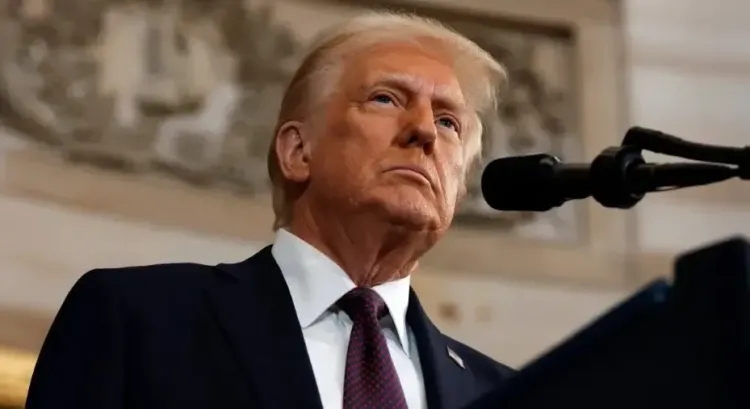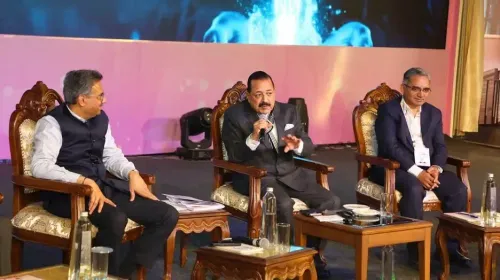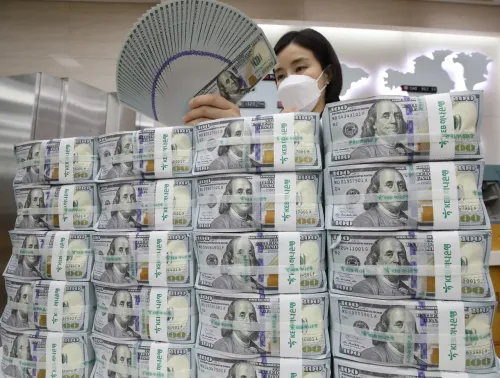Emerging Challenges and Opportunities for South Korean Industries as Trump 2.0 Begins

Synopsis
Key Takeaways
- Trump's second term raises concerns for South Korean industries.
- Potential changes to the CHIPS Act and its subsidies.
- Battery manufacturers may face margin pressures due to the IRA.
- Opportunities in shipbuilding may arise from Trump's policies.
- Monitoring supply chain disruptions is crucial for key sectors.
Seoul, Jan 21 (NationPress) With Donald Trump commencing his second term as President of the United States, South Korean industries are on high alert for any shifts in Washington's economic and trade strategies that could profoundly affect their operations in the U.S., industry analysts noted on Tuesday.
While there are widespread apprehensions regarding potential reversals of significant U.S. legislation such as the CHIPS and Science Act and the Inflation Reduction Act (IRA), certain sectors are optimistic about the possibility of enhanced cooperation with the United States, especially in shipbuilding, according to a report by Yonhap news agency.
Major South Korean technology firms, Samsung Electronics Co. and SK hynix Inc., are facing uncertainties related to the CHIPS Act, which offers subsidies to semiconductor manufacturers.
These companies have declared significant investments in the U.S. market -- Samsung is building a $17 billion semiconductor facility in Texas, while SK hynix has announced a $3.87 billion advanced packaging plant for artificial intelligence (AI) memory chips in Indiana.
Both corporations have secured commitments of $6.4 billion and $450 million, respectively, in grants from the U.S. for their investments.
Despite bipartisan support for the CHIPS Act during its enactment, experts in the industry warn that executive measures under the new Trump administration could modify its execution, potentially impacting the subsidies.
Battery manufacturers are encountering similar issues under the IRA. Companies like LG Energy Solution Ltd. and SK On Co., which depend heavily on IRA tax credits for maintaining profitability, may face reduced margins if the legislation is curtailed.
In the third quarter alone, LG Energy Solution received 466 billion won ($321.2 million), and SK On obtained 60.8 billion won in tax benefits related to the IRA. Without these benefits, both firms would essentially be incurring losses.
Some analysts in South Korea believe a total repeal of the IRA is improbable, but suggest that the eligibility criteria for subsidies received by battery manufacturers could undergo significant revisions.
Koo Ja-min, an attorney at Covington & Burling LLP and a member of the IRA advisory team of the Korea Battery Industry Association, remarked in a recent seminar in Seoul, "It would be challenging to pass a bill that repeals the IRA."
He pointed out that the IRA has spurred over $100 billion in clean energy investments and generated more than 100,000 jobs in districts primarily represented by Republicans. "Eight of the top ten districts receiving the most IRA-related investments are led by Republicans," he clarified.
Trump's campaign indicated intentions to dismantle federal mandates for electric vehicles (EVs), a decision that could hinder South Korean automakers' EV exports. Hyundai Motor Group, which has the second-largest market share for EVs in the U.S. after Tesla, may encounter considerable obstacles in amplifying its presence.
Conversely, South Korea's shipbuilding industry perceives Trump's return as a chance. Following his election in November, Trump conveyed interest in collaborating with South Korean shipyards, particularly in naval construction, repairs, and maintenance, during a phone call with South Korean President Yoon Suk Yeol.
Although South Korea has historically dominated shipbuilding orders, China surpassed it in recent years, securing 60 percent of the global market share in 2023.
"South Korean businesses are attentively observing these developments as they could lead to increased costs and disrupt supply chains, especially in critical sectors like automotive, electronics, and steel," stated an official from the Korea International Trade Association.
—IANS










